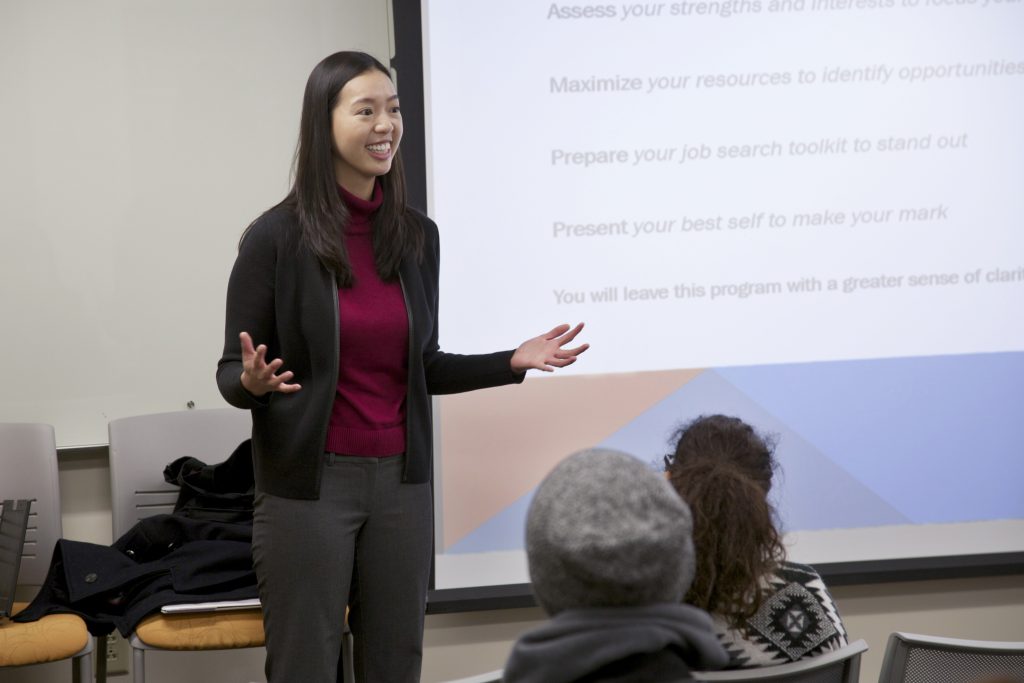
A weeklong program at Binghamton University is giving international students the opportunity to receive information and advice about how to successfully navigate a difficult job market in the United States.
The International Student Career Success Boot Camp is a program designed to assist the professional development of international students before Thursday’s Job and Internship Fair. Beginning with a résumé workshop on Monday, the week included events focusing on interviewing, networking, finding employers that hire international students and completing the necessary forms to work in the United States.
Karen Keefe-Guzikowski, the associate director of International Student and Scholar Services (ISSS), said these events provide a much-needed service to international students adapting to life in the United States.
“Something as simple as making eye-contact can be culturally viewed in very different ways,” Keefe-Guzikowski wrote in an email. “The Boot Camp unlocks this hidden set of skills and gives international students practice and strong preparation. The ISSS works closely with Fleishman Center for Career and Professional Development and the other Career Services on campus because international student’s ability to work is restricted by the regulations governing their status. Working legally and understanding these laws is critical.”
Emily Love, the international career consultant for the Fleishman Center for Career and Professional Development, said the purpose of the week’s events was to address the unique needs of international students who are looking for employment and internships. Love said obstacles international students face in an already difficult job market include visa restrictions, finding employers that hire international students and understanding a difference in communication style.
“Accelerate Your Career — Learn What Employers Want” was an event held on Monday led by Janine Bautista who graduated from BU in 2013. She graduated with a master’s in accounting and is now the assistant director of the School Of Management Career Services.
Bautista designed the activity-based workshop to showcase the differences between Eastern and Western cultures and how these differences affect the workplace. She began the presentation by listing key differences between Western and Eastern communication styles and said students from different countries need to be prepared for the direct and individualized nature of the U.S. workforce, which contrasts from the usually hierarchical and collective environment of the Eastern workforce.
“You want to place yourself in companies where you know you’re going to succeed,” Bautista said. “You don’t want to place a square into a circle when you know it’s not going to fit. So you look for companies that will allow you to flourish and grow.”
During her presentation, Bautista helped students prepare an elevator pitch, a short summary of relevant and interesting information to present to a potential employer. Students presented their pitches to fellow attendees and received feedback from Bautista.
“First impressions are so important,” Bautista said. “You want to be warm, you want to be welcoming; you want to be confident when you’re introducing yourselves to employers. You want to talk about who you are, what you do, why do you do it and how are you adding value [to the company].”
Taoran Li, a second-year graduate student from China studying public administration, attended the presentation and said she enjoyed the workshop and gained valuable information.
“I loved this one,” Li said. “It was very practical and something that you really can use, not only at the job fair but with professors and potential employers. I learned a lot. I liked that I could practice with the other students and compare.”
Wanqing Tang, a first-year graduate student from China in the master’s in business administration fast-track program, said the event helped her become more comfortable interacting with potential employers.
“I think it was very helpful for us to be here to practice,” Tang said. “It made me feel very comfortable before the actual job fair … now I know how to present myself.”


